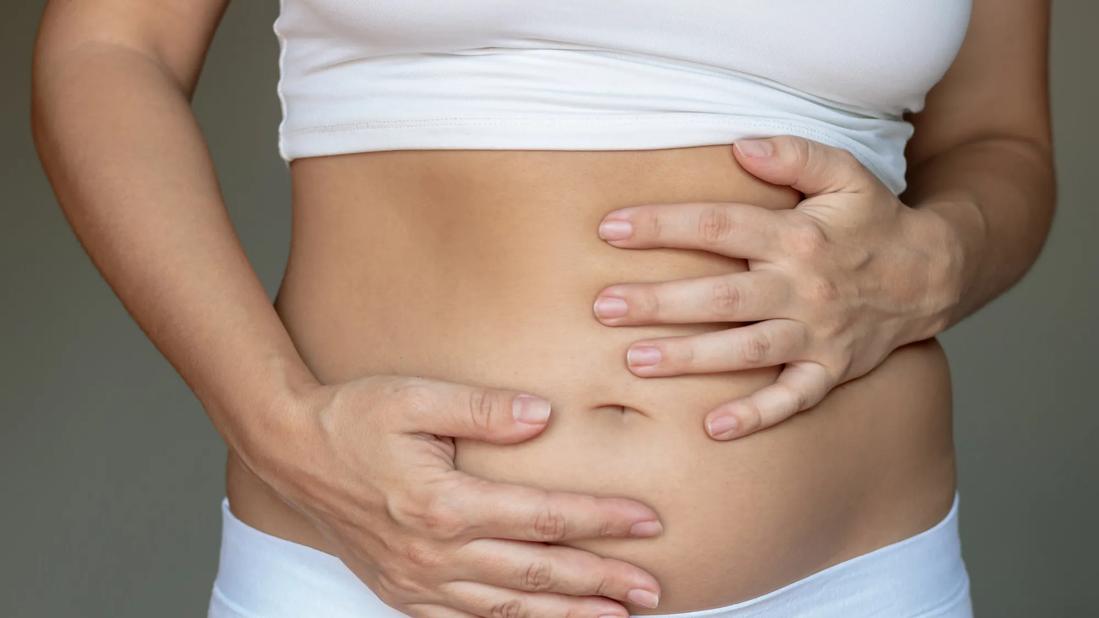Fluctuating hormones, water retention and a change in habits can cause temporary weight gain

Image content: This image is available to view online.
View image online (https://assets.clevelandclinic.org/transform/f0557e7d-c8f4-44d6-8231-17be0c1e0ae2/bloating-2157791336)
Hands holding their bloated belly
If you’ve ever stepped on the scale around your period and noticed a few extra pounds, you’re not alone. But what’s going on here? Does your period make you gain weight? Or is it just a coincidence?
Advertisement
Cleveland Clinic is a non-profit academic medical center. Advertising on our site helps support our mission. We do not endorse non-Cleveland Clinic products or services. Policy
We talked with Ob/Gyn Alison Stalzer, MD, about why your weight may change throughout your cycle.
Things like hormonal changes, water retention and other factors may mean that you’ll notice changes in your weight around your period.
“Most women experience some type of weight gain or fluctuation during their cycle, but it’s not necessarily been scientifically proven,” Dr. Stalzer says.
Still, there are some reasons why it could make sense for your cycle to impact your weight. Dr. Stalzer shares a few.
The hormone progesterone rises after you ovulate (when your ovaries release an egg). That could play a role in period-related weight gain.
After all, progesterone levels are also very high during pregnancy — a time when weight naturally increases.
“Progesterone fluctuates throughout your cycle,” Dr. Stalzer explains. “When progesterone is high, your body may be more prone to holding on to weight.”
Progesterone peaks after you ovulate and stays elevated until you start bleeding. So, if that change affects your weight, you should see it decline after your period begins.
Bloating and puffiness are common symptoms of PMS, arriving right before you start your period.
Why? That increase in progesterone just before your period starts can make your body more apt to retain water. And that can add a few pounds to the scale.
Advertisement
Cramps, fatigue and other period woes can throw your healthy habits for a loop.
“A small amount of weight gain could just be related to the fact that when you have your period, you might be more inclined to eat more salty food or sweets and not be as active as usual,” Dr. Stalzer points out.
Comfort eating and lowered activity around your period can contribute to short-term weight gain.
It’s important to note that daily weight fluctuations can affect anyone. And it’s not just due to your menstrual cycle. Meals, hydration and even bowel movements can affect your weight at any given time.
Your weight isn’t a stagnant thing, and it’s very normal for it to change a bit from day to day, even throughout the day.
“Say you have a large, salty meal. You might be two or three pounds heavier the next day, but then that goes away,” Dr. Stalzer illustrates. “Your weight is constantly in flux.”
In other words, your period may not be what’s influencing the scale.
Day-to-day weight changes are normal. And if you notice the scale tick up around your period, there are some steps you can take to help.
Here’s what Dr. Stalzer recommends:
Above all, don’t stress about the scale. Weight fluctuations are normal. If daily changes in your weight are upsetting, try to avoid fixating on daily weigh-ins, especially during your cycle.
That said, if your weight changes more than 5 pounds during your cycle, it’s worth discussing with a healthcare provider.
“Usually, period-related weight gain is nothing to write home about. Around 2 to 5 pounds is completely normal,” Dr. Stalzer reassures. “If you’re consistently gaining more than that, it’s probably worth further investigation.”
Advertisement

Sign up for our Health Essentials emails for expert guidance on nutrition, fitness, sleep, skin care and more.
Learn more about our editorial process.
Advertisement
Cravings are a natural response to hormonal changes, but giving into them may make you feel worse
These substitutes for tampons and pads can be a great option for lower cost, lower carbon footprint and longer wear times
Pads are a low-effort option for period management and come in different absorbencies, materials and shapes
Stress can cause light, late or nonexistent periods — which may eventually create a hormonal imbalance
Your period typically gets darker as the days go on, starting out pink and changing to red, dark red and even brown
Foods with iron, antioxidants and fiber can help you feel your best
If you wash regularly and change your underwear as needed, this can be a safe (and liberating) alternative to pads and tampons
Hormonal changes are the likely culprits behind the aches and fatigue before your period
Although it could be used as a moisturizer, this new trend is not recommended
Communicating clear limits helps protect your time, energy and emotional well-being
High cholesterol can be genetic, but testing and treatment can lower your heart disease risk